
News
Behind the Headlines
Two-Cents Worth
Video of the Week
News Blurbs
Articles
Testimony
Bible Questions
Internet Articles (2015)
Internet Articles (2014)
Internet
Articles (2013)
Internet Articles (2012)
Internet Articles (2011)
Internet Articles (2010)
Internet Articles
(2009)
Internet Articles (2008)
Internet Articles (2007)
Internet Articles (2006)
Internet Articles (2005)
Internet Articles (2004)
Internet Articles (2003)
Internet Articles (2002)
Internet Articles (2001)


As
the price of gasoline skyrockets, America
needs to be reminded that Bush tried to open
the Arctic National Wildlife Refuge to drilling
after September 11, 2001 when he recognized
that
our enemies in this strange, new type of
warfare were not only our allies,
they were our key oil suppliers.
But the Democrats in the House and Senate kept him from developing what would be the largest oil reserve on the North American continent...one that would keep us from being dependent on Mideast Oil for 30 years.
As the price of gasoline
skyrockets at the pumps Americans,
feeling the bite in their pockets as the national average price for a
gallon of gasoline leapfrogged over $2.10 a gallon for the first time
in the history of the nation, are demanding that Congress and and the
White House do something about it. The price of crude oil on the world
market now tops $40 per barrel. The record prices are triggered, the oil
giants maintain, by a  growing
worldwide demand for oil and oil products from the People's Republic of
China and the emerging nations, from terrorism and from the fear of terrorist
attacks against refineries (even though no such terrorist attacks have
happened)—and due to environmental regulations imposed by both State
and federal governments on the industry. And, of course, by increased
taxes on gasoline and fuel oil. Environmental groups like the Sierra
Club and Nature's Conservatory (who are financed by the Rockefeller
Foundation, the Pew Foundation and the Carnegie Trust)
have pushed for environmental regulations that are designed specifically
to make it more difficult for small oil companies to either drill for
oil or refine existing oil reserves owned by them. As a result of several Clinton-Gore EPA initiatives, most of the nation's small,
independent oil companies were forced out of business in the mid-1990s.
So were almost all of the nation's independent oil refiners. Due to intensive
lobbying by the Seven Sisters and their environmentalist shills, no new oil
refineries have been built in the United States in over 22 years. As a
result, approximately 85% of the small independent oil producers who own
the marginally-profitable oil companies in the United States have been
run out of business by Standard Oil and the Seven
Sisters since the existing refineries, which are owned by the
oil giants, refuse to process the crude oil of the independents by telling
them their storage tanks are full. And, they are. Not only are the refineries'
storage tanks full, they have trainloads of crude oil sit on rail sidings
at every refinery in the nation.
growing
worldwide demand for oil and oil products from the People's Republic of
China and the emerging nations, from terrorism and from the fear of terrorist
attacks against refineries (even though no such terrorist attacks have
happened)—and due to environmental regulations imposed by both State
and federal governments on the industry. And, of course, by increased
taxes on gasoline and fuel oil. Environmental groups like the Sierra
Club and Nature's Conservatory (who are financed by the Rockefeller
Foundation, the Pew Foundation and the Carnegie Trust)
have pushed for environmental regulations that are designed specifically
to make it more difficult for small oil companies to either drill for
oil or refine existing oil reserves owned by them. As a result of several Clinton-Gore EPA initiatives, most of the nation's small,
independent oil companies were forced out of business in the mid-1990s.
So were almost all of the nation's independent oil refiners. Due to intensive
lobbying by the Seven Sisters and their environmentalist shills, no new oil
refineries have been built in the United States in over 22 years. As a
result, approximately 85% of the small independent oil producers who own
the marginally-profitable oil companies in the United States have been
run out of business by Standard Oil and the Seven
Sisters since the existing refineries, which are owned by the
oil giants, refuse to process the crude oil of the independents by telling
them their storage tanks are full. And, they are. Not only are the refineries'
storage tanks full, they have trainloads of crude oil sit on rail sidings
at every refinery in the nation.
After the conservative consumer gas boycott on May 19th, I visited a local gas station that Saturday to "fill up.". My tank was about half full. So was my wife's. Two weeks ago, it cost about $15 to fill my wife's gas tank. (She's one of those people who waits for the red light to come on before buying gas. She appreciates those little innovative devises the auto industry puts in their cars to tell people when to fill up.) And her tank is generally running on fumes when she fills up. On the other hand, I'm a "half-tanker." When the gas gauge falls below half, I fill up. Now it's a good thing since its almost to the point where you need to go to the bank for a small loan to fill up. Topping the half-full tanks in my Olds and my wife's Cougar cost $40—the price of two full tanks two weeks ago if both cars were running on fumes. Guess its a good thing the Rockefeller family—the wealthiest family in the world—owns the heftiest share of the stock in Standard Oil and the Seven Sisters. which is actually ten of the largest oil companies in the world (excluding Royal Dutch Shell). (Exxon, Mobil, Texaco, Chevron, Sohio, Sunoco, Conoco, Atlantic Richfield, Amoco and BP America.) They also own Citicorp and Chase Manhattan which merged with J.P. Morgan to become Chase-Morgan. Now the Rockefellers can not only sell you a tankful of gasoline anywhere in the world, they can finance it for you as well.
If you recall, shortly after 9-11, President
George W. Bush announced that he intended to lessen America's dependency
on foreign oil (i;e., Mideast oil) by opening the Arctic National Wildlife
Refuge [ANWR} for oil exploration and 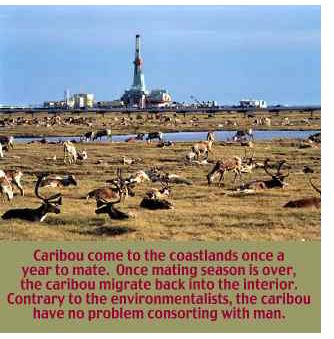 drilling.
America currently buys 55% of its domestic oil from the Persian Gulf region.
About 67% of the gasoline and heating oil consumed in the United States
comes from foreign sources. Strange as it sounds, America exports close
to half of its domestically-produced oil—and we sometimes sell it
for less than we pay the Arab world for the oil we import. We even extend
that courtesy to the former Soviet Union which has as much, if not more
oil than we do. In fact, if you recall the home heating oil crisis that
was looming large during in September, 2000 when Al Gore, Jr. was
campaigning for the White House, public pressure was brought to bear on
the Clinton Administration to tap into the Strategic Petroleum
Reserve in order to convert a sufficient amount of oil into home heating
oil to deflect the crisis so it wouldn't affect Gore's chance to
win the White House on Nov. 6, 2000.
drilling.
America currently buys 55% of its domestic oil from the Persian Gulf region.
About 67% of the gasoline and heating oil consumed in the United States
comes from foreign sources. Strange as it sounds, America exports close
to half of its domestically-produced oil—and we sometimes sell it
for less than we pay the Arab world for the oil we import. We even extend
that courtesy to the former Soviet Union which has as much, if not more
oil than we do. In fact, if you recall the home heating oil crisis that
was looming large during in September, 2000 when Al Gore, Jr. was
campaigning for the White House, public pressure was brought to bear on
the Clinton Administration to tap into the Strategic Petroleum
Reserve in order to convert a sufficient amount of oil into home heating
oil to deflect the crisis so it wouldn't affect Gore's chance to
win the White House on Nov. 6, 2000.
On September 21, 2000 Gore made an impassioned plea for Bill Clinton to transfer 500 million barrels of oil from the military's reserve into a Home Heating Oil Reserve. Thirty-four and a half million barrels were actually set aside to provide home heating oil for the elderly and the poor—and a $400 million slush fund, paid for by the taxpayers, to offset the additional costs assessed to the elderly for their heating bills that winter. The only problem was, there was no shortage of oil. The bottleneck was at the refineries. Due to the sheer volume of environmental regulations imposed through the EPA by the "environmental vice president," Al Gore, the refineries simply couldn't convert oil into gasoline and heating oil fast enough to meet demand and end the crisis. When the heating oil crisis story moved from page one of the major newspapers (which it did when Clinton dedicated the 34.5 million barrels of the Navy's strategic fuel supply to domestic home heating, Gore quietly sold the Strategic Petroleum Reserve oil to Russia (since the Clinton Administration had no place to store the oil once it was released to the civilians in the Interior Department). As far as the American consumer was concerned, the heating oil crisis of 2000 was diverted because Bill Clinton turned over millions of barrels of the Navy's oil to the elderly when, in point of fact, none of the national security oil reserves were used to offset the "shortages" the media said existed—unless the media was referring to home heating oil shortages in Russia.
America has never been more vulnerable to economic blackmail than it is today. If our Mideast trading partners and theoretic military allies decide to impose an oil embargo like they did during the Carter years, America can expect to see not only much higher prices on gasoline and oil products (which include anything plastic), but a return to double digit inflation complete with double digit interest ratesÑand perhaps even double digit unemployment to match.
The best time to solve any problem is before it becomes one. If America waits for a full-fledged OPEC oil boycott to shatter our economy before beginning to drill in the Arctic National Wildlife Refuge, it will be too late since it will take upwards of two years from the time drilling begins to impact the oil market. By the time the first barrel of ANWR oil is delivered to an American refinery, America will be experiencing a FDR-style depression—or we will have surrendered in to the Muslm extremists—and Israel will be renamed "Palestine" as it currently is on most Arab scholastic maps, and the new American statehouse will be in the Muslim city of Jerusalem.
America simply can't afford to wait.
The 19 million acre Arctic National Wildlife Refuge lies north of the Arctic Circle. In fact, it's only 1,300 miles from the North Pole—about the same distance as it is from New York to Havana, Cuba. ANWR contains one village, Kaktovik. The village has a population of 220.
America has a choice. The United States can continue to import 55% of its oil needs from the
Arab world, or it can take the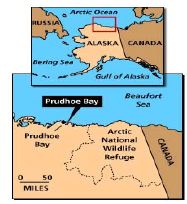 steps necessary to end America's oil dependency.
steps necessary to end America's oil dependency.
When drilling first began on the North Slope of Alaska (Prudhoe Bay) geologists estimated the oil field contained roughly 9.3 billion barrels of oil. (That number was upgraded from the original estimate of 1.9 billion barrels.) To date (before environmentalists managed to shut down most of the new oil well exploration and drilling—and even caused many existing wells to be capped), over 14 billion barrels have been sucked out from under the tundra—and the existing wells are still producing a steady stream of black gold. Geologists conservatively estimate there is enough oil under the tundra in the Arctic National Wildlife Refuge to supply all of America's oil needs for the next 30 years.
In 1923 U.S. government geologists discovered
a massive oil field in northern Alaska because of oil seepage to the surface
of the tundra. President Warren G. Harding set aside 23 million
acres as an oil reserve
for the American government. The reserve became known as Naval Petroleum
Reserve Number Four. After the Korean War, it was renamed the National Petroleum Reserve—Alaska. In the mid-1950s a group
of environmentalists decided the northeast
quadrant of the protected area would make an ideal wildlife sanctuary. 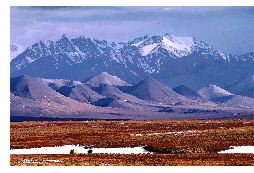 In their lobbying efforts, they called it "The Last Great Wilderness."
But, environmentalists working on behalf of Standard Oil and the Seven Sisters were unable to convince Congress that an area so
vital to the nation's national security should be declared a protected
caribou habitat where oil exploration and drilling would not be allowed
since it was claimed that oil drilling—and humans for that matter—would
disturb the ecosystem and make it uninhabitable for the native caribou
and other native Arctic wildlife.
In their lobbying efforts, they called it "The Last Great Wilderness."
But, environmentalists working on behalf of Standard Oil and the Seven Sisters were unable to convince Congress that an area so
vital to the nation's national security should be declared a protected
caribou habitat where oil exploration and drilling would not be allowed
since it was claimed that oil drilling—and humans for that matter—would
disturb the ecosystem and make it uninhabitable for the native caribou
and other native Arctic wildlife.
It would not be until 1980, when President
Jimmy Carter was fighting long lines at gas stations nationwide due
to the OPEC oil embargo—precisely when America needed to tap
into the vast oil reserves that could end America's oil dependency on
the Mideast—that the Democratically-controlled Congress enacted the Alaska National Interest Lands Conservation Act and created the Arctic National Wildlife Refuge in 19 million acres of wildlands
abutting the 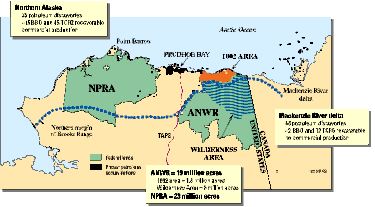 Canadian
border in what was known as the Arctic Wildlife Range. The Democrats
wanted to make certain that the next administration —which
the polls all said would be Ronald Reagan's—could not open the area
for oil exploration. While several independent wildcatters were doing
oil exploration above the Continental Divide within the Arctic Circle
most of the oil leases were owned by Standard Oil and the Seven
Sisters—and, for the most part, they were doing nothing with
them even though geologists had already estimated that there was a minimum
of 16 billion barrels of easy to extract oil—cheap oil—under
the tundra in an area designated simply as "Area 1002." It is in this area—above the divide bordering the Beaufort Sea—where
the Bush Administration wants to drill for oil. (The blue-lined
area on the map, above, denotes the targeted drilling area). Area 1002 is about 2,000 acres—about the size of a regional airport). Environmentalists
(some employed by Mobil-Exxon and BP-Amoco) have argued
that drillers would destroy the Arctic wildlife refuge and displace the
porcupine caribou that mate along the coastline every spring (where drillers
would be drilling in Area 1002).
Canadian
border in what was known as the Arctic Wildlife Range. The Democrats
wanted to make certain that the next administration —which
the polls all said would be Ronald Reagan's—could not open the area
for oil exploration. While several independent wildcatters were doing
oil exploration above the Continental Divide within the Arctic Circle
most of the oil leases were owned by Standard Oil and the Seven
Sisters—and, for the most part, they were doing nothing with
them even though geologists had already estimated that there was a minimum
of 16 billion barrels of easy to extract oil—cheap oil—under
the tundra in an area designated simply as "Area 1002." It is in this area—above the divide bordering the Beaufort Sea—where
the Bush Administration wants to drill for oil. (The blue-lined
area on the map, above, denotes the targeted drilling area). Area 1002 is about 2,000 acres—about the size of a regional airport). Environmentalists
(some employed by Mobil-Exxon and BP-Amoco) have argued
that drillers would destroy the Arctic wildlife refuge and displace the
porcupine caribou that mate along the coastline every spring (where drillers
would be drilling in Area 1002). The Gwich'in eskimos—who
depend on the porcupine caribou for their food supply and winter shelter—now
have a two-faced attitude about the potential environmental impact of
drilling in Area 1002 since they leased their lands (in the wildlife area denoted with blue
lines) to BP-Amoco and Mobil-Exxon in the expectation of
getting rich off their oil leases.
The Gwich'in eskimos—who
depend on the porcupine caribou for their food supply and winter shelter—now
have a two-faced attitude about the potential environmental impact of
drilling in Area 1002 since they leased their lands (in the wildlife area denoted with blue
lines) to BP-Amoco and Mobil-Exxon in the expectation of
getting rich off their oil leases.
But the transnational oil companies never sunk the first well. When asked, they said there were cheaper places to drill. They simply let their oil leases expire—after the Alaska National Interest Lands Conservation Act of 1980 was enacted and drilling was banned in the Arctic National Wildlife Refuge. That suggests that the only reason they bought the oil leases in the first place was to make sure the Gwich'ins couldn't sell the leases to independent oil companies and wildcat drillers who would have sunk the wells.
Why would the major oil companies refuse to drill in a bonanza oil field?
The transnational oil industry (comprised
largely of four global oil family conglomerates—the Rockefellers,
the Rothschilds, the Nobels, and the Marcus Samuels together with about 50 lesser known American families—who profited
exorbitantly from the 1911 Standard Oil break-up when they became
tutorial principles of the Seven
Sisters) believe in following the course of least resistance,
geologically speaking, in drilling for oil. Actuararily, even a novice
bean counter will 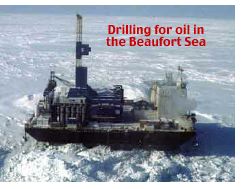 tell
you it's far less expensive to drill wells through sand and limestone
than through granite and ice, or under a mile or two of sea water in the
Beaufort Sea (which is under a sheet of slab ice about 9 or 10 months
a year). That said, it should be noted that Saudi Arabia has oil reserves
estimated to be 300 billion barrels, Kuwait—which we liberated during
the first Gulf War—has oil reserves estimated to be about 125 billion
barrels. The United Arab Emirates has reserves totaling 100 billion barrels.
Iran and Iraq are jointly sitting on about 125 billion barrels. There
are roughly a trillion barrels of cheap oil under the sand on the Arabian
Peninsula. The problem is, there isn't much profit in cheap oil, nor is
there much profit selling hard to reach oil deposits for $20 to $25 per
barrel (the normal world price for a barrel of crude). To make ANWR oil profitable, the Seven
Sisters need the global price for oil to remain static—above
the $35 per barrel level, otherwise their corporate profits will nosedive
when they begin drilling in the Arctic wildlands or under the Beaufort
Sea or, for that matter, under the South China Sea in a deal that Standard
Oil signed with the People's Republic of China two years ago. When
profits plummet, oil company shareholders become disillusioned and portfolio
managers make adjustments to more profitable stocks—those yielding
larger dividends—since most investors live off the dividends their
stock produces.
tell
you it's far less expensive to drill wells through sand and limestone
than through granite and ice, or under a mile or two of sea water in the
Beaufort Sea (which is under a sheet of slab ice about 9 or 10 months
a year). That said, it should be noted that Saudi Arabia has oil reserves
estimated to be 300 billion barrels, Kuwait—which we liberated during
the first Gulf War—has oil reserves estimated to be about 125 billion
barrels. The United Arab Emirates has reserves totaling 100 billion barrels.
Iran and Iraq are jointly sitting on about 125 billion barrels. There
are roughly a trillion barrels of cheap oil under the sand on the Arabian
Peninsula. The problem is, there isn't much profit in cheap oil, nor is
there much profit selling hard to reach oil deposits for $20 to $25 per
barrel (the normal world price for a barrel of crude). To make ANWR oil profitable, the Seven
Sisters need the global price for oil to remain static—above
the $35 per barrel level, otherwise their corporate profits will nosedive
when they begin drilling in the Arctic wildlands or under the Beaufort
Sea or, for that matter, under the South China Sea in a deal that Standard
Oil signed with the People's Republic of China two years ago. When
profits plummet, oil company shareholders become disillusioned and portfolio
managers make adjustments to more profitable stocks—those yielding
larger dividends—since most investors live off the dividends their
stock produces.
The age of the cheap ride is gone. While there is enough retrievable oil under the crust of the Earth and under its oceans to provide for all of man's energy needs for the next 500 years, fossil fuels—whether coal or oil—cannot replenish themselves. Every million barrels of oil or ton of coal used is a million barrels of oil or tons of coal that no longer exists. Ultimately, when they're gone, they will be gone forever.
For the past 150 years Standard Oil has carefully gauged the depletion of this critical natural resource, and trying to find ways to curb its use while maintaining the company's bottom line with less "inventory" consumption. In 1900, Standard Oil scientists calculated that, without very careful conservation, the world's supply of oil would be depleted in 50 to 100 years. In 1999 the Scientific Journal estimated that, roughly, there are about 1,000 billion barrels of oil left in the Earth that can be extracted by traditional means. Their estimates are extrapolations from production statistics on existing wells. The database is flawed since the Seven Sisters' funded environmentalists have done their jobs well and have stymied almost all oil exploration in North America over the past two decades. Furthermore, there has been little oil exploration in the former Soviet Union whose oil reserves will rival those of the Mideast when fully exploited.
In 1998 when they issued their report on the end of cheap oil, the Scientific Journal conclusions suggest that within a decade of their report—by 2007—due largely to the deliberate curbing of oil production by the oil giants, the price of gasoline could exceed $4.00 per gallon in the United States. Over the next couple of years, we can expect to see several sharp spikes in price at the gas pumps followed by slight reprieves caused by temporary gluts that will serve only as staging plateaus for the next wave of price increases. With a diminishing supply of the most valuable commodity in the world, the global oil cartel will continue to control supply throughout the world in order to increase demand—and profits.
While President George W. Bush was backed by Standard Oil money in 2000, he is now fighting the global oil cartel and the environmental lobbyists who have been filling the campaign coffers of ecoalarmlist Democrats since 1988. I'd like to believe that Bush was smart enough to realize that you can't the win the War on Terrorism if you are providing the terrorists with the money they need to wage war against you. I'd like to believe that Bush was smart enough to realize that you can't win the War on Terrorism when you are dependent on the terrorists for the oil you need to fuel your own economy—and your war machines (since the Strategic Oil Reserves can be tapped only in times of declared war when critical oil supplies are cut off from reaching our refineries and our ships at seas, planes in the army and trucks and tanks on the ground).
And, I'd also like to believe that Bush was enough of a student of history when he was earning his MBA at Yale to remember how the Arab oil cartel turned oil into a very powerful weapon that brought the American economy crashing down around Jimmy Carter's ears. Bush apparently was such a student of history since he tried to open Area 1002 to oil exploration and drilling. The Democratic-controlled Senate that blocked his attempts in 2001 apparently was not. Those who fail to learn from history, are doomed to relive it. Of course, the Democrats know that, with the help of a very compliant liberal media pointing fingers away from them, Congress is never blamed for the sins they commit—the man in the White House, upon whose watch the rape of the American people takes place is always blamed—even when the rape is committed by the "loyal" opposition.
Only this time around—just for once—I'd like to think that the American people are smart enough to think this one through without the help of the New York Times and the Washington Post, and remember that by opening ANWR, Bush would have provided America with a new oil stream to offset any planned embargo by our "allies" in the Mideast.
America should also remember what happened when Bush tried to reverse several Bill Clinton Executive Orders that impacted the oil industry by forcing the shutdown 85% of the independent oil refineries and most of the small, mom and pop oil companies in the country. Liberal Democrats took Bush to court and a Clinton federal judge ruled that, in this one instance, because Bush had "political motives" for wanting to undo Clinton's executive orders, he could not reverse Clinton's environmental decrees. The Clinton Executive Orders, signed in the midnight hours before Clinton left the White House (but after Gore lost his frantic bid to steal the White House), caused hundreds of producing wells to be capped because they lacked the means to have their oil refined—and caused hundreds of small manufacturers to close their doors and ship their jobs to Mexico.
And, oh—by the way, Executive Order constitutionally have no force of law since the President of the United States has neither the legislative or judicial authority to issue binding orders on the people of the United States. (This was a practice initiated by Franklin D. Roosevelt as a convenient tool to create legislation that Congressmen and Senators could never enact and keep their jobs. Legally, Executive Orders are nothing more than glorified interoffice memos from the "boss" to his employees. When the President of General Motors issues a policy memo to the mid-level management of its Chevrolet, Buick, Cadillac, and Pontiac divisions, that memo does not affect the management of Ford or Chrysler. When Bill Clinton issued an Executive Order banning smoking in all federal government buildings, Congress literally told him to kiss their butts, and reminded him that Executive Orders are glorified interoffice memos that affect only the employees of the Executive Branch of government. Think about that one the next time Congress starts wringing their hands about a presidential Executive Order that legislates a "new direction" for the nation.
Well, once again, you have my two cents worth.



Copyright © 2009 Jon Christian Ryter.
All rights reserved.


